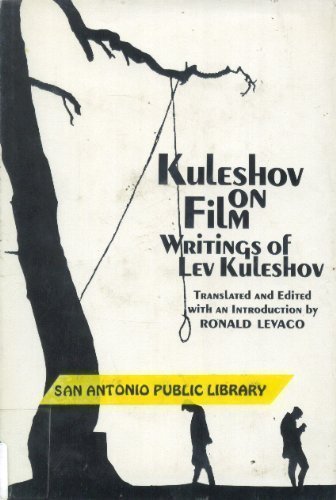Kuleshov on Film: Writings by Lev Kuleshov by Lev Vladimirovich Kuleshov, Ronald Levaco


Kuleshov on Film: Writings by Lev Kuleshov Lev Vladimirovich Kuleshov, Ronald Levaco ebook
Publisher: Univ of California Pr
ISBN: 0520026594, 9780520026599
Page: 121
Format: pdf
He and his contemporary, Lev kuleshov, two of the earliest film theorists, argued that montage was the essence of the cinema. The year after The Gold Rush and Battleship Potemkin, Eisenstein's teacher Kuleshov turned in his own gold rush masterpiece. So basically the Kuleshov effect is a cinematic editing technique that was developed by this Russian bloke Lev Kuleshov in the early 20th century. Cowritten with Viktor Shklovsky, and featuring Aleksandra Khoklova I'll be writing more about this film here in the not-too-distant future. Through-out the films that Kuleshov was creating they contained propaganda a form of information that is biased to support a specific view (in this issue it was a government, political view). The films were becoming stylised and increasingly difficult to make. . -Lev Kuleshov (from "The Principles of Montage" in The Practice of Film Direction, 1935). In his essay Art of the Cinema, Lev Kuleshov describes making a sequence in Engineer Prite's Project (1917-18): It was necessary for our leading characters, a father and his daughter, to walk across a meadow and interior monologues; the compressed writing of the voice-overs; the reliance on atmospheric effects – also encouraged allusions to genre: Gothic fiction, or even expressionism. Since the beginning of the film era people have been watching, and talking about, and writing about movies. « newer: The URI to TrackBack this entry is: http://keiran.blogsome.com/2006/09/04/kuleshov-usfilm/trackback/. Named after Lev Kuleshov, the conductor of this experiment and an influential filmmaker of the mid-twentieth century Soviet Union, the Kuleshov Effect refers to the idea that "the meaning of a shot is determined not only by the content of the shot, "Kuleshov Effect." ∇troperville. Po Lakonu by Lev Kuleshov: Better known for an eponymous montage principle than for his too-rarely-seen films, Kuleshov momentarily set aside his avant-garde proclivities with this 1926 screen adaptation of Jack London's The Unexpected. Less well known among film students, however, are Kuleshov's actual films. Eisenstein was a pioneer in the use of montage, a specific use of film editing. "Basic Film Techniques: The Kuleshov Effect." The Motley View. Every student of film is no doubt familiar with the name Lev Kuleshov and his famous Kuleshov effect.

